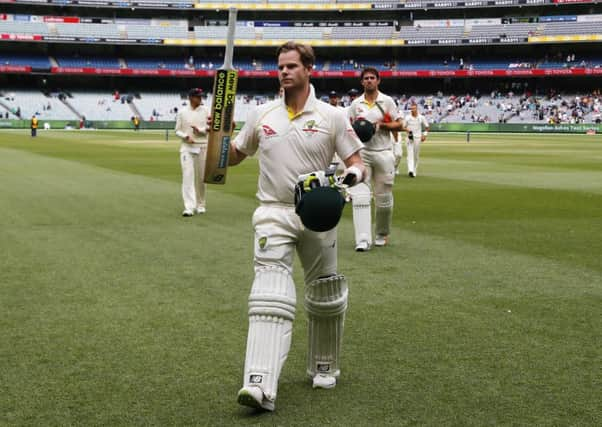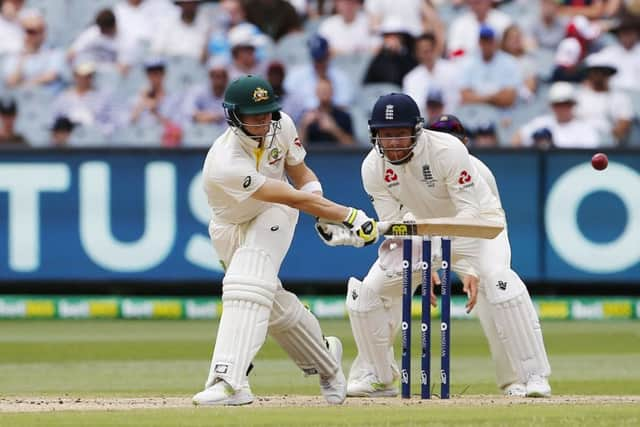Chris Waters _ The Ashes: Steve Smith proves once more that his batting is from another galaxy


Were Smith to make two ducks in the match that starts at 11.30pm on Wednesday UK time – an occurrence about as likely as an outbreak of world peace to welcome in the New Year – his series average would fall from 151.00 to 100.66.
More likely, of course, is that it will only rise higher, just like a man whose star presently shines brighter than Rihanna’s diamonds.
Advertisement
Hide AdAdvertisement
Hide AdSmith’s latest tour de force – a match-saving hundred in the Melbourne Test – proved him a Jack of all trades and a master of them too.
It was positively Boycottian in its fierce concentration, Smith’s unbeaten 102 coming from 275 balls in almost seven-and-a-half hours.
Although the pitch was as lifeless as most of our solar system, as if the drop-in pitch had been dropped in from Pluto, Smith still flourished in conditions alien to the long-term health of Test cricket.
That pitch encouraged neither batting fluency nor bowling finesse, but Smith still had to dig deep after Australia slipped to 178-4 in their second innings on the final day – effectively 14-4 – with a little over two sessions remaining as England looked for silver linings after losing the first three Tests and, with them, the Ashes.
Advertisement
Hide AdAdvertisement
Hide AdThus Smith, who can put his foot down with the best of them, or else adapt his approach to more challenging situations, proved why he is not only the No 1-ranked batsman in the world at present, but also one of the most complete batsmen that the game has ever seen.


The numbers now being achieved by this chap are rapidly assuming astronomical proportions.
Smith, 28, appears to be batting in a galaxy of his own, one that would take even Virat Kohli, Joe Root and Kane Williamson light years to reach.
This was Smith’s third hundred of the series, his fifth in his last 15 Ashes innings, his sixth of the Test match year, his fourth in successive Melbourne Tests, and his 23rd in a career spanning 110 Test innings.
Advertisement
Hide AdAdvertisement
Hide AdOnly Don Bradman (59 innings) and Sunil Gavaskar (109) got to 23 hundreds faster, and that takes no account of the fact that Smith – who began his Test career as a leg-spinner batting at No 8 – was like a restaurant aperitif that takes an eternity to arrive: namely, a slow starter.


A century at the Oval in 2013 opened the floodgates and, by tightening a technique that still pleasantly defies description and makes a mockery of time-honoured coaching tenets, Smith has excelled to the extent that 2017 was the fourth successive year in which he had made more than 1,000 Test runs at an average over 70.
His century in Melbourne, which followed an unbeaten 141 in the first Test in Brisbane and 239 in the third match in Perth, saw him become the first Australia captain since Bradman to register three hundreds in an Ashes series.
Comparisons with Bradman, although essentially the purview of the lazy or ill-informed, are at least becoming dimly plausible, even though Bradman (career average 99.94 to Smith’s 63.55) was statistically about one-third better than anyone else who has played the game.
Advertisement
Hide AdAdvertisement
Hide AdThe all-time International Cricket Council rankings, in fact, now see Smith (947 points) second only to Bradman (961), with Smith having jumped above Len Hutton (945) and Jack Hobbs (942).
Such exercises may satisfy a thirst for historical context, but they are unsatisfactory in terms of establishing pecking order, and it remains as impossible to effectively compare sportsmen of different eras as it is to determine whether life exists beyond this vale of tears. Perhaps the only pertinent comparison to Bradman lies in Smith’s thirst for runs and his single-minded determination to score them.
Like Bradman, Smith cares little for style, only for substance, and he is favoured with rare powers of concentration – perhaps the biggest quality that marked Bradman out from the rest during the inter-war era, according to eye-witnesses.
When asked after the Melbourne Test whether he is cognizant of the comparisons being made to Bradman, Smith answered well.
Advertisement
Hide AdAdvertisement
Hide Ad“You can never be satisfied and never think you’re too good for the game,” he replied, adding that “the game can come back to bite you pretty quickly”.
Smith also said after the match that he does not actually enjoy watching cricket.
This was a startling observation to many, who probably imagine that Charles Dickens spent all of his non-writing time reading books, or Mozart his non-composing moments listening to other people’s music.
Smith’s words hinted at a perspective beyond the sport he graces but also betrayed the underlying point, which is that what he really enjoys is batting.
Advertisement
Hide AdAdvertisement
Hide Ad“I just love batting and being out in the middle getting things done,” he said, suggesting that if other people want to compare him to players from different epochs, they can get on with it.
For all Smith really cares about, as he has been busy showing these last few weeks, is racking up gluttonous quantities of runs.